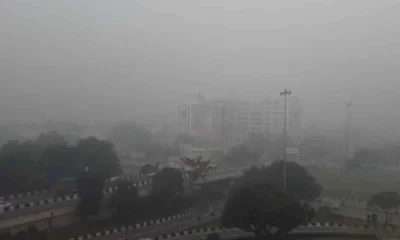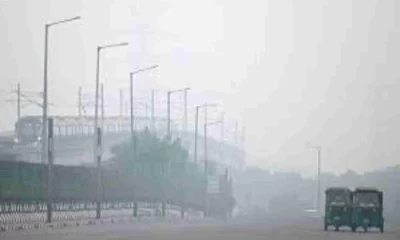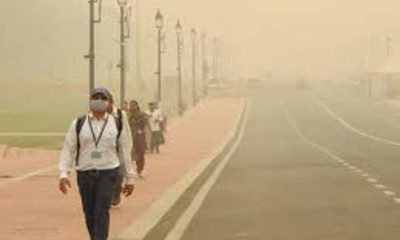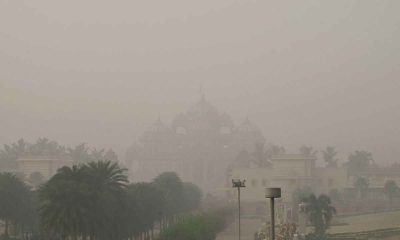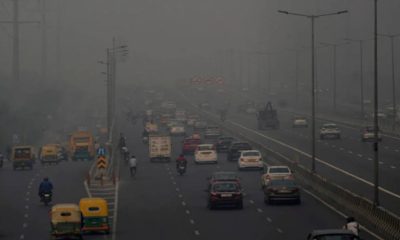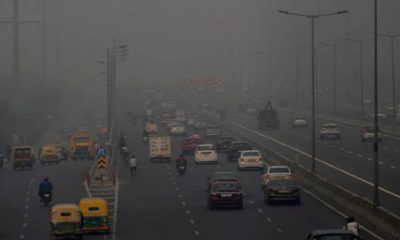India News
Delhi pollution: Stage 3 anti-pollution measures invoked in Capital as air quality deteriorates
The Commission for Air quality Management (CAQM) urged the authorities to decide on discontinuing physical classes for students up to Class V.
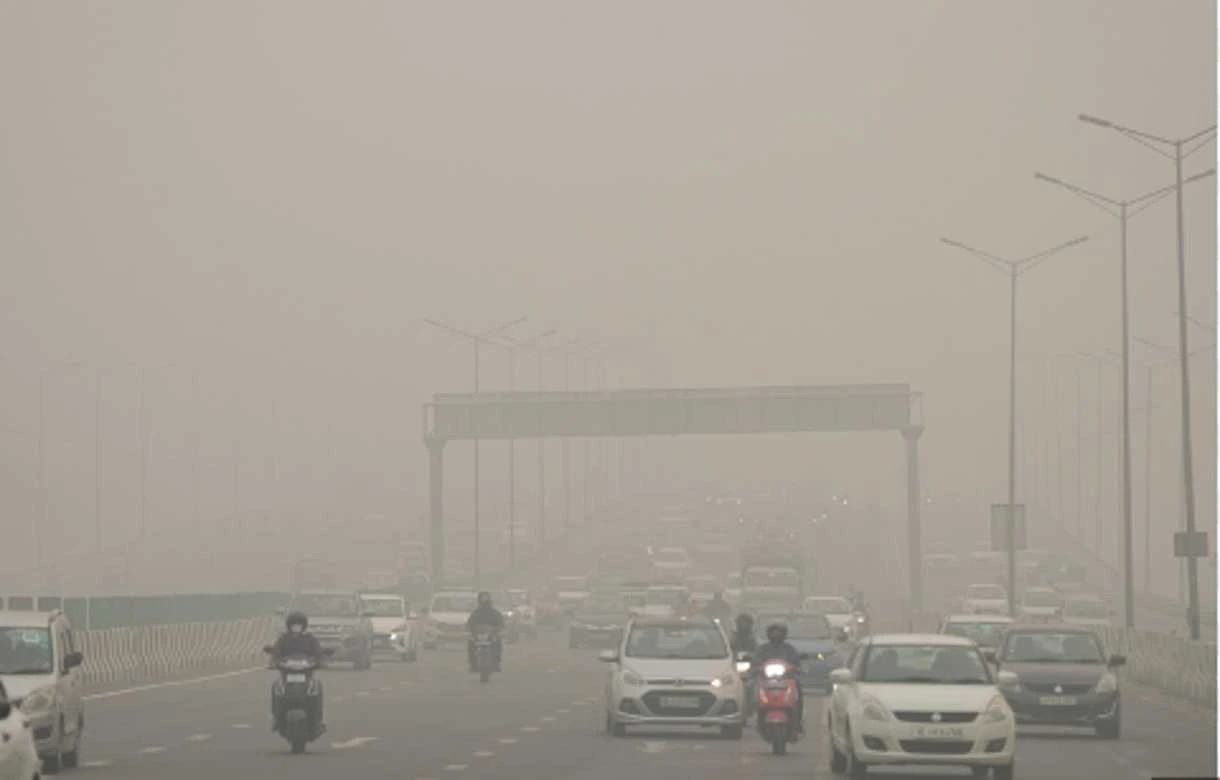
As air quality in Delhi and National Capital Region slipped to the severe category, restrictions under stage 3 of anti-pollution measures have been invoked in the regions. Under the stage-3 of anti-pollution measures, all non-essential construction work has been banned in Delhi and NCR.
The Commission for Air quality Management (CAQM) also urged the authorities to decide on discontinuing physical classes for students up to Class V. The central commission, under the Graded Response Action Plan (GRAP), has also banned plying of BS-III petrol and BS IV diesel four-wheelers in Delhi, Noida, Gurugram, Faridabad, Ghaziabad, and Gautam Budh Nagar and asked governments to ensure it.
Reports said that the 24-hour overall Air Quality Index in the national capital on Friday stood at 409 at 4 pm, in the severe category, and it is expected to worsen in the coming days. As per the central commission, the unfavourable meteorological conditions including fog and haze with low wind speed are the major causes for a sudden dip in the air quality.
Issuing an order, the Commission for Air quality Management (CAQM) stated that various agencies responsible for implementing measures under GRAP and Pollution Control Boards (PCBs) of the national capital region and DPCC have also been advised to ascertain strict implementation of actions under Stage-III of GRAP along with actions under Stage-I and Stage-II of GRAP during this period.
Reports stated that the anti-pollution steps under the 8-point action plan by the central commission are: Intensify the frequency of mechanised and vacuum-based sweeping of roads, ensure daily water sprinkling, along with dust suppressants, before peak traffic hours on roads and pollution hotspots, intensify public transport services and introduce differential rates to encourage off-peak travel, enforce a strict ban on construction and demolition activities in the entire NCR, except essential projects, close down operations of stone crushers, close down all mining and associated activities in NCR, impose strict restrictions on the operation of BS III petrol and BS IV diesel LMVs, make a decision on discontinuing physical classes in schools for children up to class 4 and conduct classes in an online mode.
India News
Security forces arrest 14 Pakistani nationals with around 86 kg of drugs, worth Rs 600 crore near Gujarat Coast
The Indian Coast Guard took to X and wrote in a breathtaking overnight operation, Indian Coast Guard undertook an intelligence-based anti-narcotics operation at sea on 28 Apr 24. About 86 kg of narcotics which is worth Rs 600 crore has been apprehended along with the arrest of 14 Pakistani nationals.
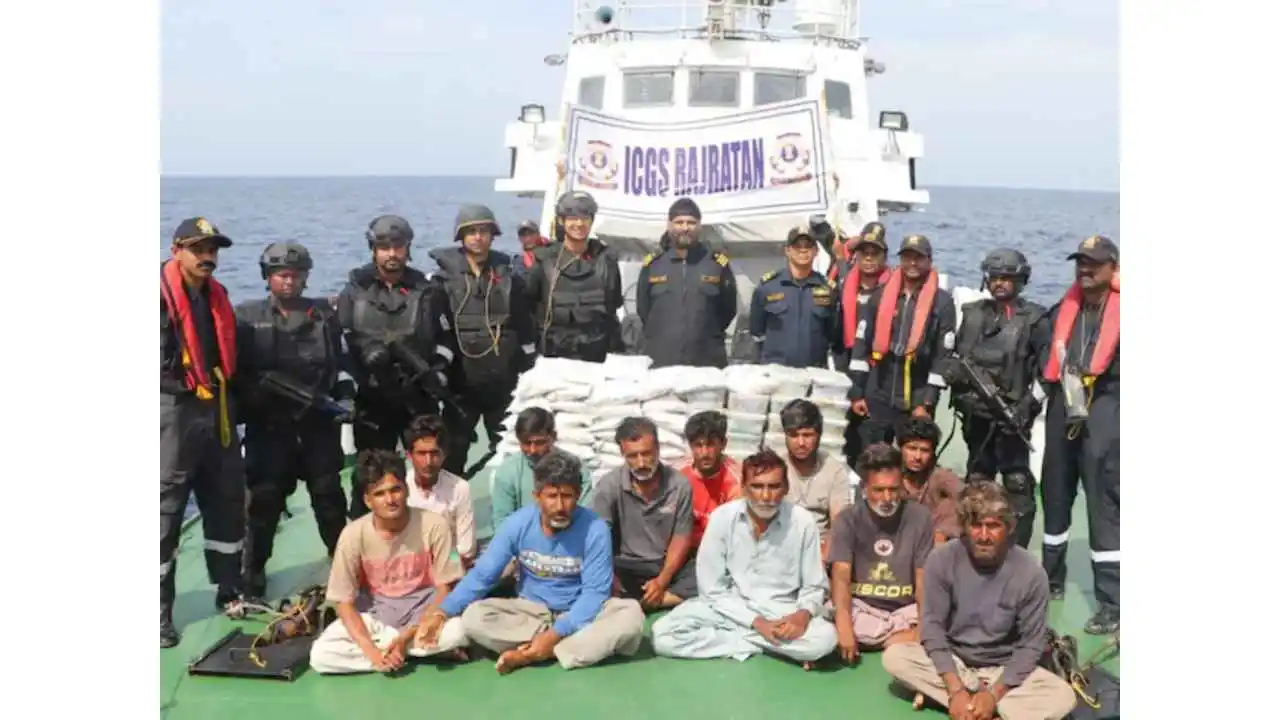
The Indian Coast Guard on Sunday announced the interception of a Pakistani vessel laden with 86 kg of narcotics valued at Rs 600 crore. Acting on intelligence, a joint operation involving the Indian Coast Guard, the Anti-terrorism Squad (ATS), and the Narcotics Control Bureau (NCB) was launched to combat drug trafficking in the area.
The operation was carried out by the agencies based on intelligence inputs received in the last few days. The Indian Coast Guard took to X and wrote in a breathtaking overnight operation, Indian Coast Guard undertook an intelligence-based anti-narcotics operation at sea on 28 Apr 24.
About 86 kg of narcotics which is worth Rs 600 crore has been apprehended along with the arrest of 14 Pakistani nationals. The operation was an epitome of inter-agency coordination wherein the Indian Coast Guard Anti-terrorism Squad and Narcotics Control Bureau collaborated seamlessly which resulted in the successful operation.
The ships and aircraft of the Indian Coast Guard had been deployed on concurrent missions to carry out the operation. ICG ship Rajratan, which had Narcitics Control Bureau and Anti Terrorist Squad officials embarked, positively identified the suspect boat.
No amount of evasive maneuvering tactics and resistance employed by the drug laden Pakistani boat could save it from the swift and strong action of ICG ship Rajratan. This operation took place on the basis of a tip-off by the Indian Coast Guard, Narcotics Control Bureau and Gujarat Anti-Terrorist Squad in the Arabian Sea near the International Maritime Boundary Line.
The operation was the 2nd major anti-narcotics operation carried out by the security forces in the Arabian Sea in 1 month. Earlier on February 26, 5 foreign nationals were held off the Porbandar coast with 3,300 kg of narcotics, including charas. Recently a boat carrying 60 packets of drugs was seized and 6 Pakistani crew members onboard the vessel were arrested off the Gujarat coast in a multi-agency operation in March.
2024 Lok Sabha Elections
Election Commission orders AAP to modify Lok Sabha campaign song
AAP minister Atishi attacked the ECI for putting a ban on the party’s Lok Sabha election campaign song. She said this has happened for the first time in the history of India that the Election Commission has put a ban on the election song of a political party.
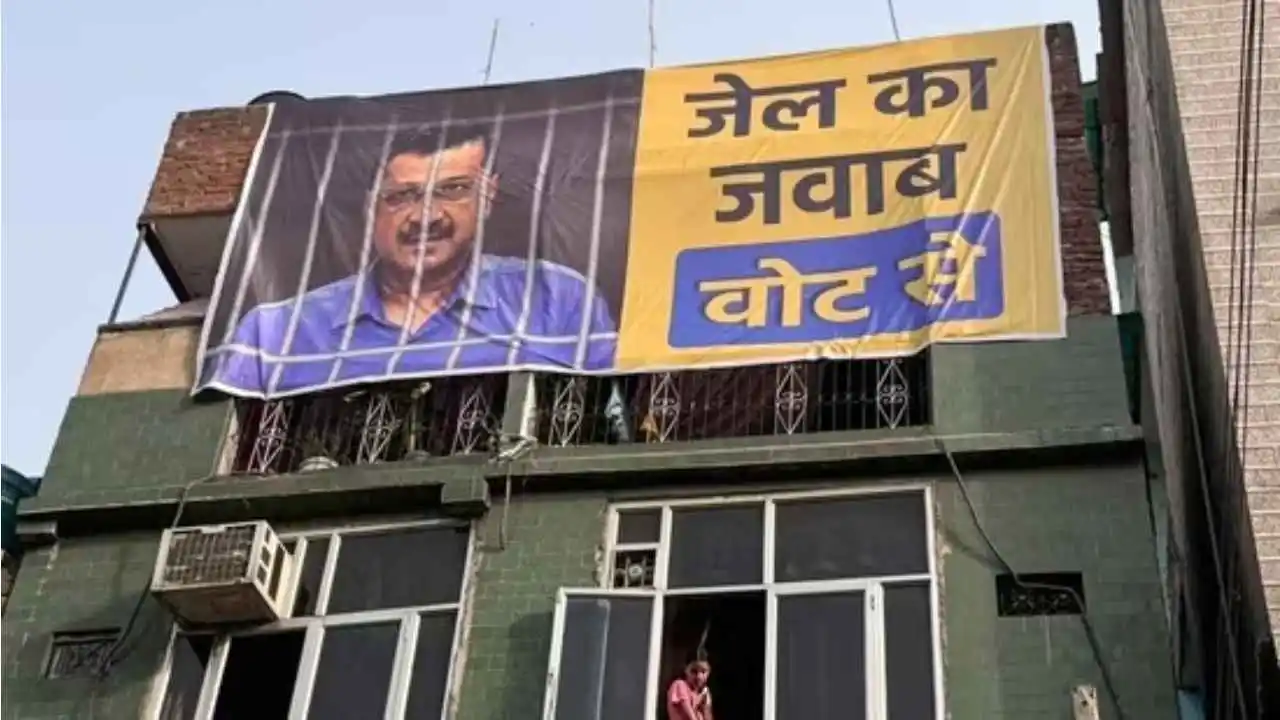
The Election Commission of India asked the Aam Aadmi Party to modify its election campaign song on Sunday. The Election Commission pointed out that the phrase jail ke jawaab me hum vote denge shows an aggressive mob holding the photo of Arvind Kejriwal showing him behind bars, casts a bad impression of the judiciary. The ECI added that the phrase appears several times in the advertisement which contravenes the provisions of ECI Guidelines and Rule 6(1\(g) of Programme and Advertising Codes prescribed under the Cable Television Network Rules, 1994.
AAP minister Atishi attacked the ECI for putting a ban on the party’s Lok Sabha election campaign song. She said this has happened for the first time in the history of India that the Election Commission has put a ban on the election song of a political party.
The Election Commission listed some of the phrases that it found in violation of codes. The phrase: Tanashahi party ko hum chot denge with the video clip showing the protesters clash with the police (running from 00:21 to 00:23) incites violence. The phrase: gunda gardi ke khilaf vote denge and Tanashahi karne wali party ko hum chot denge running from duration 00:27 to 00:32 Sec with the video clip showing Manish Sisodia being escorted by the police. The words and the video clip shows the police in bad light.
The Election Commision said the phrase: Awazein khilaf thi jo sabko jail me daal dia, bas unko hi bahar rakha jisne inko maal dia. Itna lalach, itna nafrat, bhrastachari se mohabbat shows slanderous remarks and is a criticism of BJP on the basis of unverified facts and also casts bad impression of the judiciary. The Election Commission stated that the phrase Tanashahi party ko hum chot denge with the video clip showing aggressive mob clashing with the police shows criticism of the ruling party based on unverified facts.
2024 Lok Sabha Elections
PM Modi criticises Rahul Gandhi for allegedly insulting Hindu kings, accuses Congress of not addressing atrocities by Muslim rulers
The prime minister was addressing an election rally in Karnataka’s Belagavi where he said, the statements made by the Shehzada of Congress have been made very thoughtfully to appease their vote bank. But the Shehzada does not utter a word about the atrocities committed by the Nizams, Nawabs, Badshahs and Sultans.
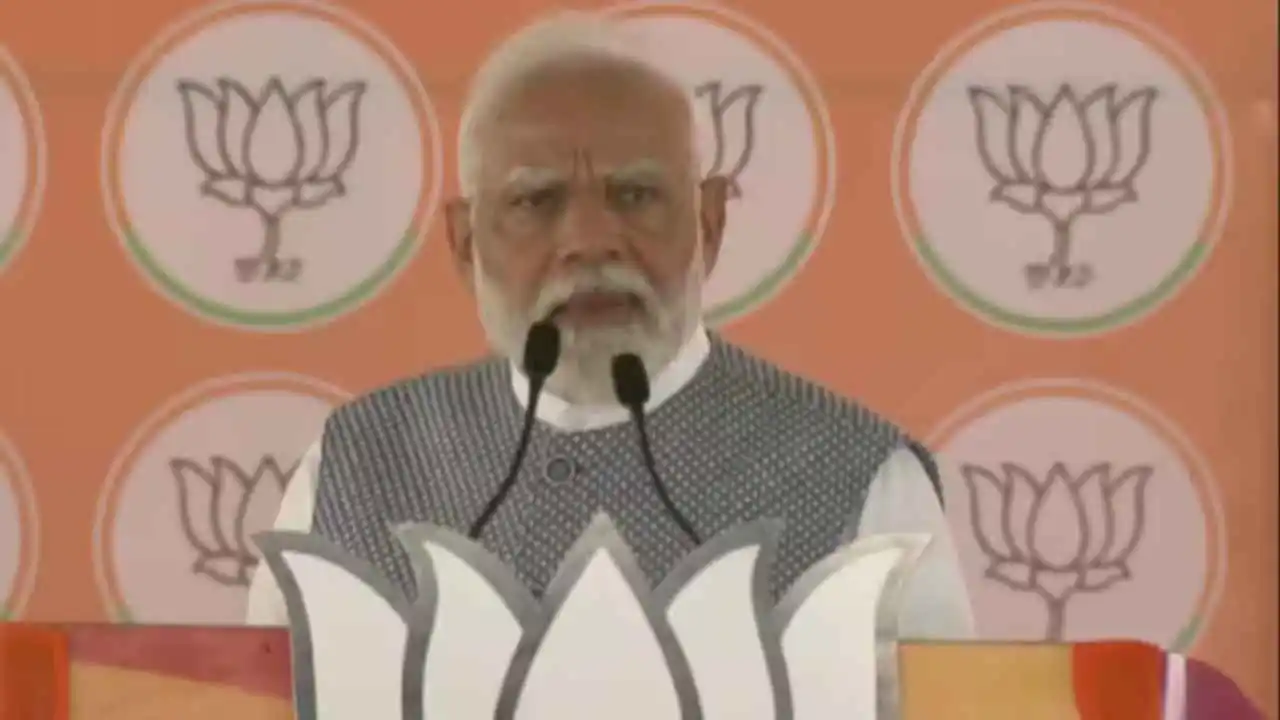
Prime Minister Narendra Modi on Sunday attacked Congress leader Rahul Gandhi for allegedly insulting Hindu kings but not saying a word on atrocities committed by Muslim rulers like Aurangzeb. The prime minister was addressing an election rally in Karnataka’s Belagavi where he said, the statements made by the Shehzada of Congress have been made very thoughtfully to appease their vote bank. But the Shehzada does not utter a word about the atrocities committed by the Nizams, Nawabs, Badshahs and Sultans.
Congress does not remember the atrocities committed by Aurangzeb who destroyed thousands of Hindu temples. He said Congress forms political alliances with parties who praise Aurangzeb. PM Modi said the Congress do not talk about all those who destroyed Hindu pilgrimage sites, looted them, killed Hindu people, and killed cows.
The Prime Minister was referring to a video clip of Rahul Gandhi which was shared by many BJP leaders. In the video clip, the Gandhi is heard saying, during the rule of Rajas and Maharajas, they could do whatever they wanted and even grab someone’s land. The Congress fought for India’s independence and brought democracy in the country.
PM Modi also mentioned the death of a Karnataka Congress corporator’s daughter, who was killed by her former colleague in her college. He said the Congress government gives priority to appeasement and for them, the lives of daughters like Neha have no value. The prime minister further added that the Congress is only concerned about its vote bank.
Neha Hiremath, daughter of Congress Councillor of Hubballi-Dharwad Municipal Corporation Niranjan Hiremath, was murdered on the campus of BVB College on April 18 by her ex-classmate Fayaz. PM Modi accused Congress for supporting anti national parties like PFI (Popular Front of India) for votes which is an anti-national organisation that gives shelter to terrorism and which has been banned by the Modi government.
-

 Entertainment4 hours ago
Entertainment4 hours agoHappy Birthday Samantha Ruth Prabhu: Social media wishes Queen of South Indian Cinema on her 37th birthday
-
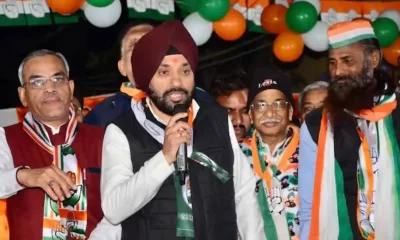
 India News7 hours ago
India News7 hours agoDelhi Congress President Arvinder Singh Lovely resigns, says he feels handicapped under Deepak Babaria’s leadership
-
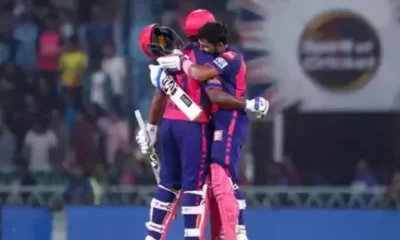
 Cricket news8 hours ago
Cricket news8 hours agoIPL 2024: Rajasthan Royals beat Lucknow Super Giants by 7 wickets and 6 balls to spare
-
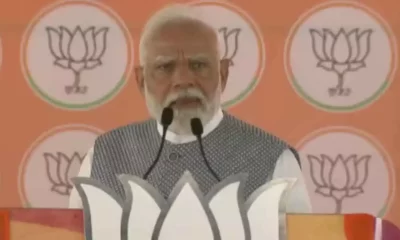
 2024 Lok Sabha Elections6 hours ago
2024 Lok Sabha Elections6 hours agoPM Modi criticises Rahul Gandhi for allegedly insulting Hindu kings, accuses Congress of not addressing atrocities by Muslim rulers
-
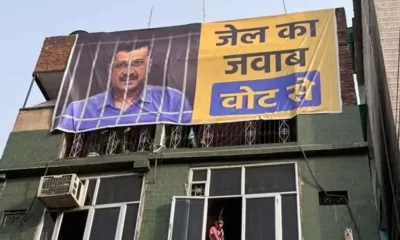
 2024 Lok Sabha Elections3 hours ago
2024 Lok Sabha Elections3 hours agoElection Commission orders AAP to modify Lok Sabha campaign song
-
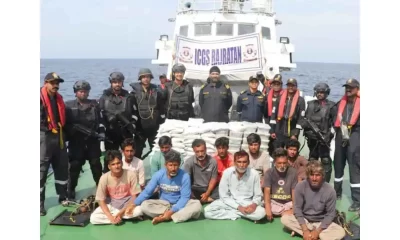
 India News2 hours ago
India News2 hours agoSecurity forces arrest 14 Pakistani nationals with around 86 kg of drugs, worth Rs 600 crore near Gujarat Coast
-

 Entertainment51 mins ago
Entertainment51 mins agoDIL-LUMINATI TOUR: Diljit Dosanjh creates history by performing for 54000 fans in Canada, post goes viral

